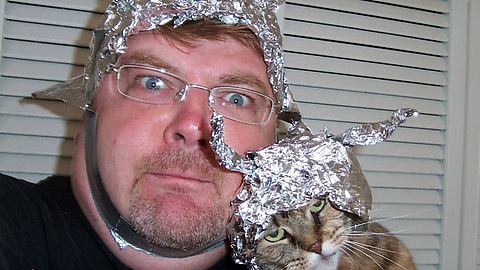Revival of the Conspiracy Theorist

The Illuminati, 9/11 being an inside job, JFK’s assassination, the moon landing being a hoax, and a global government made up completely of lizard people impersonating political figures are some of the tinfoil-hatted conspiracy theorist’s greatest hits. Conspiracies; defined as a belief that some covert but influential organization is responsible for a circumstance or event, have seemingly died out. Much of the craziness and finger pointing from those who buy into these theories went dormant in the mid to late 2000’s. Since the rise of social media however, it seems a resurgence of these and newfound ideas have found their way into the hearts and minds of many who’ve never been exposed to anything but mainstream media. When presented with the fact that 29% of 18 to 50 year-olds “actively” use Twitter whereas just 42% of people below the age of 70 “often” watch television news, sophomore Nathalie LaFontant stated “it just goes to show how the times are changing…” and that they are. By being trapped in a group of like minded individuals, it’s often difficult to distinguish fact from fiction.
TIME magazine recently wrote an article entitled “Why Smart People Still Believe Conspiracy Theories.” This investigated the reasons and facts behind the modern-day conspiracy theorist. The article; written by Jeffrey Kluger, gives scientific and investigative evidence toward the reasoning behind many falling into the trap of conspiracy. Kluger cited studies by the University of Illinois where they found that at least 20% of Americans still believe in a link between vaccines and autism, and at least 37% think global warming is a hoax. He circulates how obviously untrue these ideas are, even going as far as to say, “Despite mountains of scientific evidence to the contrary, close to half of us accept the existence of some conspiracy.”
It is important to qualify many psychological studies built to disprove these theories by acknowledging that the belief in conspiracy led to the findings of the CIA’s dosing of civilians with LSD in the 1950’s as well as discovering the cause of the Vietnam War with the Gulf of Tonkin incident was completely falsified. Many academics, including Dr. Mike Klepper of the Drug Administration Institute, even commented, “For the evil our government does, tinfoil hats are simply not required, and are indeed a detriment.” This does not however reconcile the fact that many believe in the completely untrue. Being able to separate the truth from a compelling tale is a skill many have lost. The ability to connect with like-minded individuals and block out any that disagree creates echo chambers in which confirmation bias is rampant. Senior Liam McCammon even commented, “On social media like Twitter and Facebook, people end up going down rabbit holes to the point where they hear nothing but what they believe to be true.” Many need to remain beholden to intellect and rationality rather than the appeals of emotional or ideological pulls. All in all, being able to discern something that has fact from that which is based on fear or hatred toward a greater power is a skill that everyone needs in the age of connectivity.


